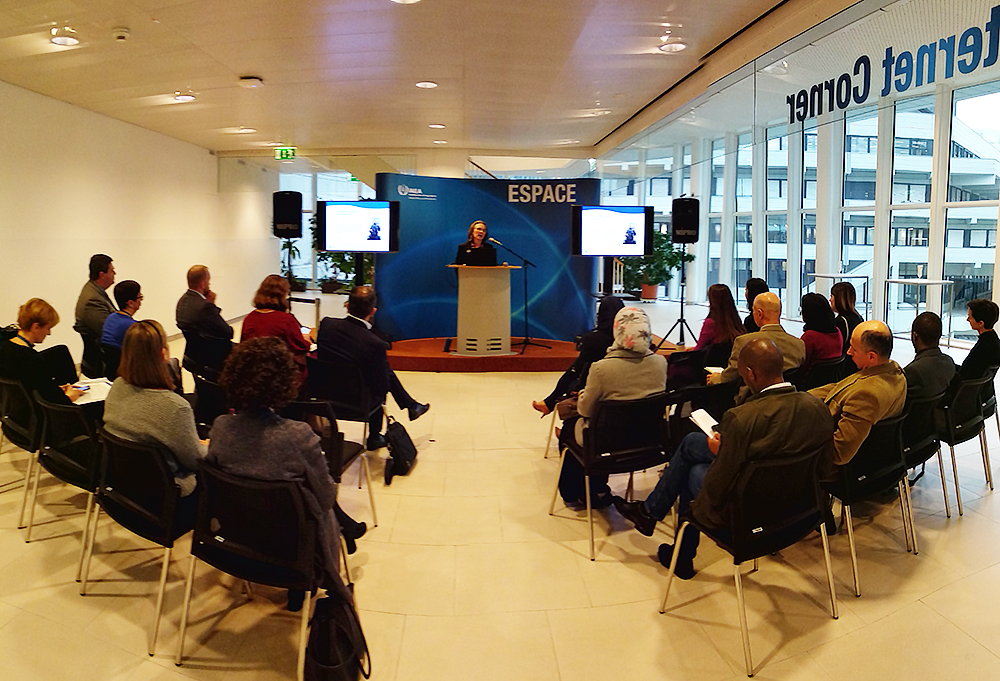On 6 December 2018, Rhonda Evans, Head of the WINS Academy, convened a lunchtime presentation on why it is important to increase the participation of women in nuclear security and how to do so. The event took place at the Vienna International Centre during the IAEA International Conference on the Security of Radioactive Material.
The session attracted an interested and engaged audience, including Ambassador Laura Holgate and INMM President Cary Crawford.
Questions for Consideration
Ms Evans explained that sector-specific research has revealed women are underrepresented in the industries commonly associated with the use of nuclear and other radioactive material. A current estimate is that women comprise only 20% of the overall nuclear workforce; this figure may be even smaller within the nuclear security workforce and even smaller within cybersecurity as a subset of nuclear security.
How do we increase female representation in the nuclear security sector to 50%?
Research has demonstrated that organisations with a diverse, inclusive workforce enjoy numerous benefits, from increased creativity to increased revenue.
How do we harness the best talent for effective and sustainable nuclear security?
One of the most important ways to encourage younger women to enter the nuclear security field is to ensure there are role models who can provide examples and mentors who can provide guidance.
How can we better highlight women who are currently working in nuclear security?
It is important to have male champions for this change, such as WINS Board Chair William Tobey and WINS Executive Director Roger Howsley, who are actively participating in the International Gender Champions programme.
How can we encourage more leaders in the nuclear industry to become gender champions?
Concrete Steps WINS Is Taking to Increase Diversity
Ms Evans explained that WINS has developed a variety of initiatives to address these imbalances, including:
- Creating scholarships specifically for women who would like to participate in the WINS Academy programme and obtain professional certification as a Nuclear Security Professional.
Increasing the numbers of women in certified training programmes will support their career advancement in nuclear security.
- Providing increased support for women who would like to participate in WINS events and ensuring gender balance among expert presenters at WINS events and training courses.
This emphasises the importance of role models and mentors for women within the nuclear security sector.
- Creating a dedicated Gender Equality section on the WINS website. In the months to come, this section will gradually expand as WINS’ programme grows. It will also provide a central hub for reporting the progress being made throughout the industry and the results.
This will demonstrate progress at key stages of the programme.
- Forming strong working relationships with other advocacy groups, such as Women in Nuclear, Women in International Security, and Friends of Women in Nuclear.
This will help to encourage growth in the networks supporting women in nuclear security.
2019 Research Project
Ms Evans also explained that in 2019 WINS will undertake an extensive research project on the barriers that must be overcome to achieve gender equality in the nuclear security sector. The research will:
- Examine the competency framework for nuclear security and identify pathways for women who wish to enter the nuclear security field.
- Identify the limiting factors that currently inhibit women from entering the field and methods that would facilitate their doing so.
- Target a variety of stakeholders, including industry and regulators.
Ms Evans concluded the event by urging attendees to make their own commitments to taking concrete steps toward the promotion of equal representation among women and men in the nuclear security sector.
